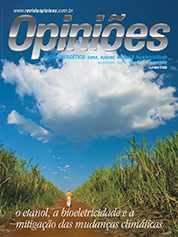Marina Silva
Senator of Brazil
Op-AA-22
December of 2009, an historical moment
We are on the eve of COP 15, The UNO’s Climate Convention, to be held in Copenhagen, Denmark, in the first half of December. It is a moment of great expectation and concern, given that the large negotiation blocks and countries lack proposals capable of directing the initiatives of local governments, companies, entrepreneurs and citizens in one single direction: to significantly reduce greenhouse gas (GHG) emissions, so as to stabilize the concentration of these gases in the Earth’s atmosphere, at levels one may consider safe for mankind and other forms of life on the planet.
These safe levels, according to the scientific panel IPCC (Intergovernmental Panel on Climate Change) have been translated to percentages that end up in a heap of numbers, difficult to comprehend by non-specialists. What one wants to accomplish is a reduction of emissions, within a certain time, based on the level of emissions that existed in the past.
In other words, to put the brakes on the escalation of environmental degradation, creating a useful reference that can be measured and understood around the world.Thus, the safety level to be attained, identified by the scientists, would require a global reduction in GHG emissions, so that in 2030 they would be no higher than 60% to 75% of the emissions measured in 1990.
In addition, in 2050 they may not be higher than 20% to 40% of the 1990 emissions. These figures leave no doubt that farreaching changes in consumption and production standards of goods and services in our societies are necessary. It will not be initiatives of the type “more of the same” that will lead us to safe levels of GHG concentrations in the atmosphere.
If the world accepts these IPCC recommendations and does its homework in a serious and responsible manner, the outlook would be an average temperature increase on the planet of 2 °C by the end of the century. If we stick to current global emission standards, the increase in temperature would reach 2 °C around 2060, bringing about major complications for life on Earth and would immediately and mainly affect poorer populations.
Furthermore, one must take into consideration that the IPCC’s recommendation inevitably entails a certain degree of uncertainty, meaning that all this may actually happen a little earlier than one can predict today. In other words, there is no time to lose. What can be done? Much.
Bearing in mind that the Climate Convention introduces a principle of justice when it sets ordinary and differentiated responsibilities - which are the weight of the economies, the participation of countries in formatting the problem and their capability of contributing to the solution - we can begin to identify, in our societies, the GHG emission sources that can be reduced and eliminated over the next decades.
In Brazil, these sources have already been identified: deforestation and cattle-raising, followed by transportation, and in the near future, the thermoelectric generation of electricity. Based on this knowledge, one can plan, with reasonable safety, concrete steps for the short-term reduction of GHG emissions and, more importantly, the changes in consumption and production of goods and services that make life sustainable.
In Brazil, the fact that renewable sources account for 46% of the energy matrix provides the country a major advantage in formulating and introducing changes and directing them towards a society adjusted to the current limits and demands of the global climate system. However, to advance in this direction is but one of our tasks.
The other, just as important, is to share with the rest of the world, our successful experiences in the production and consumption from renewable energy sources. In this respect, ethanol from sugarcane plays a unique role. Areas around the globe appropriate for sugarcane production happen to be in developing countries with a strong agricultural tradition.
Even some countries in Africa and the Caribbean that have a recent history of armed conflict can benefit to the extent that the transition process to more democratic regimes progresses. Actually, it is quite possible that ethanol production from sugarcane will be an important component for establishing stable trade relations between these countries and the international community.
In turn, the commercial insertion of developing countries in the international market plays an important role in these societies’ political stability, by generating income and creating jobs and professional activities in different segments of society. We are here not advocating a return to the production of sugarcane derived products in developing countries for exclusive consumption by the richer countries. Quite to the contrary.
Domestic consumption would be the first step in warranting that in trade relations the rich countries would not completely unbalance the negotiations. One can also not ignore that technological development will bring about diversification of crops and raw materials to produce ethanol. Technological development requires surplus funds. Sugarcane is the only raw material capable of producing ethanol and generating essential funds for a series of priority investments, such as in education.
Brazil can significantly contribute to this process, whether by sharing our expertise in production, or by means of international activities to defend the adoption of international standards, warranting social and environmental sustainability in the production of biofuel. In doing so, we would truly commit to social and environmental sustainability of our own production, while also fostering the adoption of advanced public policies and virtuous processes in other countries.




